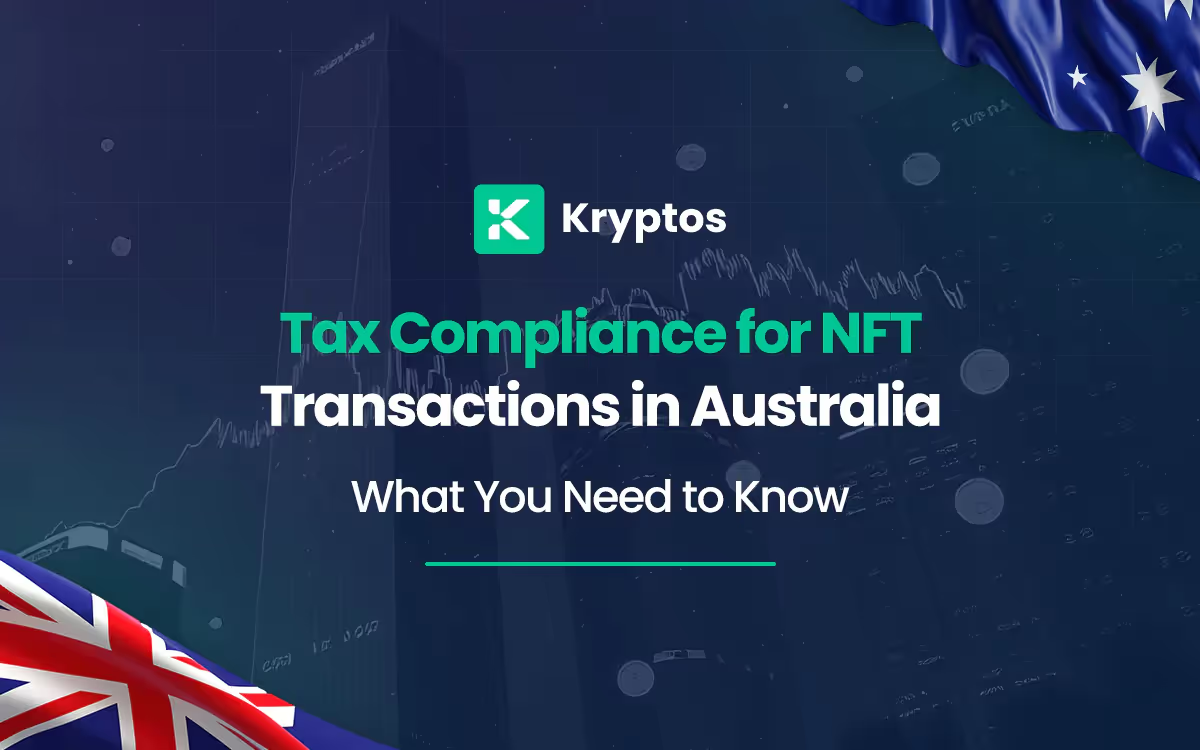.avif)
Calculate Your Crypto
Taxes in Minutes

Introduction
As Non-Fungible Tokens (NFTs) continue to gain traction within the digital asset ecosystem, they have emerged as a significant asset class that Australian investors and creators are increasingly engaging with. However, the complexities surrounding the tax treatment of NFTs can be daunting, particularly in the rapidly evolving regulatory landscape. This blog will provide a deep dive into how the Australian Taxation Office (ATO) currently views NFTs, recent updates to the regulatory framework, and how platforms like Kryptos can streamline the tax reporting process for NFT transactions.
Current Rules: How NFTs are Classified and Taxed in Australia
In Australia, NFTs are generally treated as assets for tax purposes, similar to other forms of cryptocurrency. The ATO classifies NFTs as capital assets, which means they are subject to Capital Gains Tax (CGT) when they are disposed of. Here's a breakdown of how NFTs are classified and taxed:
- Capital Gains Tax (CGT) Implications:
- Acquisition: When you purchase an NFT, the cost of acquisition, including any associated fees, forms the cost base of the asset.
- Disposal: If you later sell or trade the NFT, the difference between the sale price and the cost base is your capital gain or loss.
- CGT Discount: If you've held the NFT for more than 12 months, you may be eligible for a 50% CGT discount on any capital gains, applicable to individuals and some trusts.
- Personal Use Assets:
- Some NFTs might qualify as personal use assets if they are acquired for personal enjoyment (e.g., digital art purchased solely for display). However, the ATO has stringent criteria for this classification, and most NFTs used in investment or trading are not considered personal use assets.
- GST and NFTs:
- The Goods and Services Tax (GST) may also apply to transactions involving NFTs, particularly for creators selling NFTs as part of a business. The tax treatment will depend on whether the sale of the NFT is considered a taxable supply.
Recent Updates: Latest ATO Guidelines on NFTs
The ATO has been proactive in updating its guidelines to address the unique challenges posed by NFTs. Some of the recent updates include:
- Clarification on NFT Classification:
- The ATO has clarified that NFTs are generally treated as intangible property, distinct from other cryptocurrencies like Bitcoin or Ethereum. This distinction is crucial because it affects how transactions are recorded and reported for tax purposes.
- Tax Treatment of NFT Staking and Yield Farming:some text
- With the rise of NFT-based staking and yield farming, the ATO has provided guidance on how these activities should be taxed. Income earned through staking NFTs or participating in NFT yield farming is considered ordinary income and must be reported on your tax return.
- Record-Keeping Requirements:
- The ATO has emphasised the importance of meticulous record-keeping for NFT transactions. Taxpayers must maintain detailed records of purchase and sale dates, transaction values in AUD, and any associated fees. This is particularly important given the volatility of cryptocurrency prices.
Use Case: Tax Implications for an Australian Crypto User
Consider an Australian crypto enthusiast, Jane, who buys and sells NFTs as part of her investment strategy. Here’s how the tax implications might play out:
- Purchase of an NFT:
- Jane buys an NFT for 2 ETH on January 1, 2023, when the value of 1 ETH is AUD 4,000. Her cost base for the NFT is AUD 8,000.
- Selling the NFT:
- In December 2023, Jane sold the NFT for 3 ETH, with the value of 1 ETH now at AUD 5,000. The sale value is AUD 15,000.
- Jane's capital gain is AUD 15,000 (sale value) - AUD 8,000 (cost base) = AUD 7,000.
- CGT Liability:
- Since Jane held the NFT for more than 12 months, she is eligible for a 50% CGT discount. Therefore, her taxable capital gain is AUD 3,500.
- If Jane's marginal tax rate is 32.5%, she will owe AUD 1,137.50 in CGT.
Kryptos Solution: Simplifying NFT Tax Reporting
Managing tax obligations for NFT transactions can be overwhelming, especially with the complexities of CGT calculations, staking income, and fluctuating cryptocurrency prices. This is where Kryptos comes into play:
- Automatic Transaction Tracking:
- Kryptos automatically tracks all NFT transactions across various platforms and wallets. This ensures that every buy, sell, and transfer is accurately recorded, along with the corresponding AUD values at the time of the transaction.
- Capital Gains Tax Calculation:
- Kryptos simplifies the calculation of capital gains by automatically determining the cost base and sale value for each NFT transaction. The platform also applies any relevant CGT discounts, ensuring accurate reporting.
- Comprehensive Record-Keeping:
- With Kryptos, users can maintain comprehensive records that meet ATO requirements. The
platform generates detailed reports that include the purchase and sale dates, transaction values in AUD, and any fees involved, ensuring that you have all the documentation you need in case of an audit.
- Real-Time Compliance Updates:
- Kryptos is continuously updated with the latest ATO guidelines, ensuring that your tax reporting is always compliant with current regulations. This proactive approach helps you stay ahead of any changes in the tax landscape.
- Support for Staking and Yield Farming:
- Kryptos also tracks income from NFT staking and yield farming, categorizing it as ordinary income and integrating it seamlessly into your overall tax reporting. This feature is particularly useful for users involved in complex DeFi activities.
Conclusion
Navigating the tax implications of NFT transactions in Australia can be challenging, especially given the rapid pace of regulatory updates and the intricacies of cryptocurrency taxation. However, with the right tools, such as Kryptos, staying compliant doesn’t have to be overwhelming. By automating transaction tracking, simplifying CGT calculations, and ensuring up-to-date compliance, Kryptos empowers Australian crypto users to manage their NFT tax obligations with confidence and ease.
As the NFT market continues to evolve, staying informed about tax regulations and leveraging advanced tax software like Kryptos will be key to ensuring that your digital assets are both profitable and compliant.
| Step | Form | Purpose | Action |
|---|---|---|---|
| 1 | 1099-DA | Reports digital asset sales or exchanges | Use to fill out Form 8949. |
| 2 | Form 1099-MISC | Reports miscellaneous crypto income | Use to fill out Schedule 1 or C. |
| 3 | Form 8949 | Details individual transactions | List each transaction here. |
| 4 | Schedule D | Summarizes capital gains/losses | Transfer totals from Form 8949. |
| 5 | Schedule 1 | Reports miscellaneous income | Include miscellaneous income (if not self-employment). |
| 6 | Schedule C | Reports self-employment income | Include self-employment income and expenses. |
| 7 | Form W-2 | Reports wages (if paid in Bitcoin) | Include wages in total income. |
| 8 | Form 1040 | Primary tax return | Summarize all income, deductions, and tax owed. |
| Date | Event/Requirement |
|---|---|
| January 1, 2025 | Brokers begin tracking and reporting digital asset transactions. |
| February 2026 | Brokers issue Form 1099-DA for the 2025 tax year to taxpayers. |
| April 15, 2026 | Deadline for taxpayers to file their 2025 tax returns with IRS data. |
| Timeline Event | Description |
|---|---|
| Before January 1, 2025 | Taxpayers must identify wallets and accounts containing digital assets and document unused basis. |
| January 1, 2025 | Snapshot date for confirming remaining digital assets in wallets and accounts. |
| March 2025 | Brokers begin issuing Form 1099-DA, reflecting a wallet-specific basis. |
| Before Filing 2025 Tax Returns | Taxpayers must finalize their Safe Harbor Allocation to ensure compliance and avoid penalties. |
| Feature | Use Case Scenario | Technical Details |
|---|---|---|
| Automated Monitoring of Transactions | Alice uses staking on Ethereum 2.0 and yield farming on Uniswap. Kryptos automates tracking of her staking rewards and LP tokens across platforms. | Integrates with Ethereum and Uniswap APIs for real-time tracking and monitoring of transactions. |
| Comprehensive Data Collection | Bob switches between liquidity pools and staking protocols. Kryptos aggregates all transactions, including historical data. | Pulls and consolidates data from multiple sources and supports historical data imports. |
| Advanced Tax Categorization | Carol earns from staking Polkadot and yield farming on Aave. Kryptos categorizes her rewards as ordinary income and investment income. | Uses jurisdiction-specific rules to categorize rewards and guarantee compliance with local tax regulations. |
| Dynamic FMV Calculation | Dave redeems LP tokens for Ethereum and stablecoins. Kryptos calculates the fair market value (FMV) at redemption and during sales. | Updates FMV based on market data and accurately calculates capital gains for transactions. |
| Handling Complex DeFi Transactions | Eve engages in multi-step DeFi transactions. Kryptos tracks value changes and tax implications throughout these processes. | Manages multi-step transactions, including swaps and staking, for comprehensive tax reporting. |
| Real-Time Alerts and Updates | Frank receives alerts on contemporary tax regulations affecting DeFi. Kryptos keeps him updated on relevant changes in tax laws. | Observe regulatory updates and provide real-time alerts about changes in tax regulations. |
| Seamless Tax Reporting Integration | Grace files taxes using TurboTax. Kryptos integrates with TurboTax to import staking and yield farming data easily. | Direct integration with tax software like TurboTax for smooth data import and multi-jurisdictional reporting. |
| Investor Type | Impact of Crypto Tax Updates 2025 |
|---|---|
| Retail Investors | Standardized crypto reporting regulations make tax filing easier, but increased IRS visibility raises the risk of audits. |
| Traders & HFT Users | To ensure crypto tax compliance, the IRS is increasing its scrutiny and requiring precise cost-basis calculations across several exchanges. |
| Defi & Staking Participants | The regulations for reporting crypto transactions for staking rewards, lending, and governance tokens are unclear, and there is a lack of standardization for decentralized platforms. |
| NFT Creators & Buyers | Confusion over crypto capital gains tax in 2025, including the taxation of NFT flips, royalties, and transactions across several blockchains. |
| Crypto Payments & Businesses | Merchants who take Bitcoin, USDC, and other digital assets must track crypto capital gains for each transaction, which increases crypto tax compliance requirements. |
| Event | Consequences | Penalties |
|---|---|---|
| Reporting Failure | The tax authorities can mark uncontrolled revenues and further investigate. | Penalty fines, interest on unpaid taxes and potential fraud fees if they are deliberately occurring. |
| Misreporting CGT | Misreporting CGT Error reporting profits or losses can trigger the IRS audit. | 20% fine on under -ported zodiac signs, as well as tax and interest. |
| Using decentralized exchanges (DEXs) or mixers without records | The IRS can track anonymous transactions and demand documentation. | Possible tax evasion fee and significant fine. |
| Disregarding Bitcoin mining tax liabilities | Mining reward is considered taxable income, and failure of the report can be regarded as tax fraud. | Further tax obligations, punishment and potential legal steps. |
| Foreign crypto holdings: Non-disclosure | Foreign-accepted crypto FATCA may be subject to reporting rules. | Heavy fines (up to $ 10,000 per fracture) or prosecution for intentional non-transport. |
File Your Crypto Tax in Minutes










